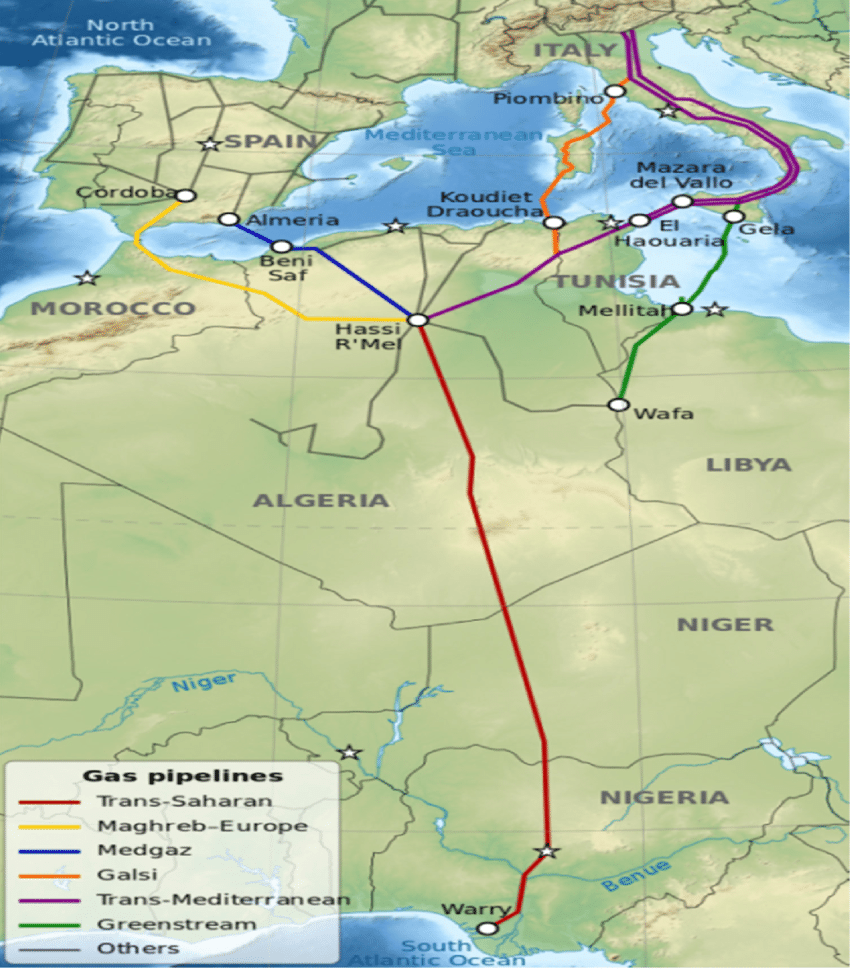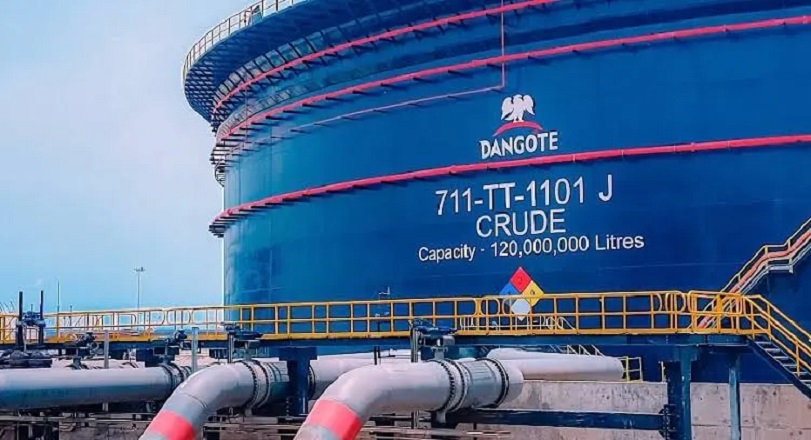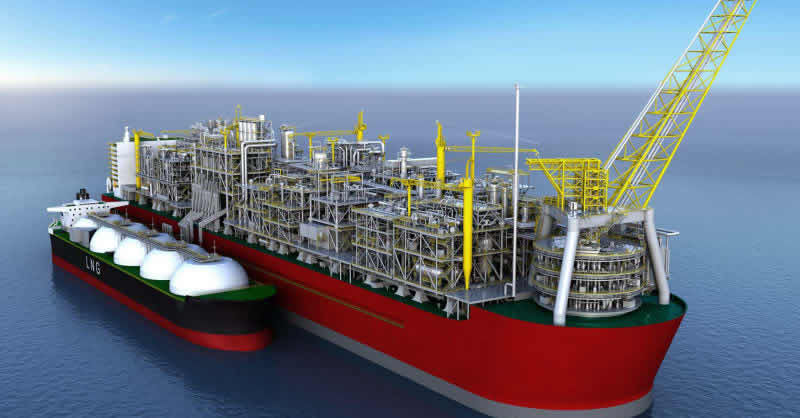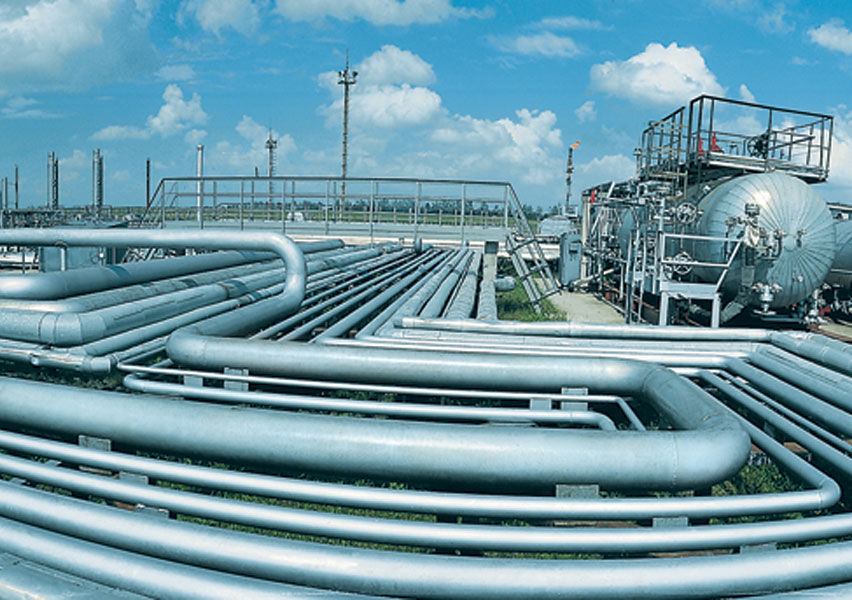Economy
$13bn Trans-Saharan Gas Pipeline to Boost Nigeria’s Gas Exports

By Adedapo Adesanya
Nigeria is set to boost its gas development initiative through exports to Europe after reaching a new milestone in further opening the domestic and regional gas market via the construction of the multi-billion Trans-Saharan Gas Pipeline (TSGP) alongside Algeria and Niger.
The oil ministers of the three countries — Mr Mahamane Sani Mahamadou, Minister of Petroleum for the Republic of Niger, Mr Mohamed Arkab, Minister of Energy and Mines, Algeria, and Mr Timipre Sylva, Minister of State for Petroleum Resources of Nigeria as well as the Director Generals of national oil companies (NOCs) of the three African countries met to discuss the implementation of the TSGP on June 20, 2022, in Abuja.
During the meeting, which follows the signing of the Niamey Declaration during the 3rd Forum of the Economic Community of West African States in February 2022, parties established a task force and roadmap for the development of the TSGP.
It was disclosed that the TSGP project will mark a new era of improved regional cooperation in Africa, enhancing gas monetization and exports while scaling up exports to Europe via Algeria.
Not only will the $13 billion project drive socioeconomic growth by unlocking massive investments across the energy sector, but it will also help create jobs in various industries including energy, petrochemicals and manufacturing whilst optimizing energy production and positioning Africa as a global energy hub.
A steering committee made up of the three Ministers and Director Generals of the NOCs, established during the two-day meeting, will be responsible for updating the feasibility study for TSGP and will meet at the end of July 2022 in Algiers to discuss how to progress with the TSGP project.
With energy poverty increasing across the African continent due to limited investments in energy projects, delays in exploration, production and infrastructure rollout, the COVID-19 pandemic, and global energy transition-related policies, the TSGP project will bring in a new era of energy reliability for Africa.
With the 4,128 km pipeline running from Warri in Nigeria to Hassi R’Mel in Algeria via Niger, the pipeline will not only create a direct connection between Nigeria and Algeria’s gas fields to European markets but will bring significant benefits to Nigeria.
The pipeline will enable up to 30 billion cubic meters of natural gas to be traded yearly enhancing regional and international energy trade.
With gas emerging as the energy of the future, the TSGP project will play a critical role in positioning Nigeria, alongside Algeria and Niger, at the forefront of the energy transition.
Economy
Oil Prices Surge as Strait of Hormuz Traffic Freezes Amid Iran-Israel Row

By Adedapo Adesanya
Oil prices surged 8 per cent on Monday as Israel and US strikes on Iran and retaliation by the Islamic Republic forced shutdowns of oil and gas facilities across the Middle East and disrupted shipping in the crucial Strait of Hormuz.
Brent crude rose 8.7 per cent or $6.36 to trade at $79.23 per barrel, while the US West Texas Intermediate (WTI) crude expanded by $7.8 per cent or 5.27 per cent to $72.29 per barrel.
Oil’s surge on the restart of trading after the weekend, however, was smaller than expected. On Sunday, some analysts had predicted oil would open above $90 a barrel and closer to $100.
The widening Iranian conflict is disrupting oil flows to several Asian countries as vessels are bottled up within the Middle East Gulf, and crude and transport costs are rising.
US President Donald Trump signalled the US-Israel military assault could continue for weeks, which could mean a prolonged disruption of traffic through the Strait of Hormuz, through which around 20 per cent of global oil output and a similar share of liquefied natural gas transits via ships from Middle East producers.
On Monday, Saudi Arabia shut its biggest domestic oil refinery after a drone strike. Qatar halted production of liquefied natural gas, and state-owned QatarEnergy was set to declare force majeure on LNG shipments.
The widening Iran conflict also left 150 ships stranded at anchor around the Strait of Hormuz after a seafarer was killed and at least three tankers were damaged.
The disruptions highlight the risks to Asia, the world’s biggest oil-consuming region, which sources 60 per cent of its oil from Middle Eastern producers. For instance, an extended disruption of the Strait would push oil prices higher and could cause supply shortages to China and India, the world’s biggest and third-biggest oil importers, forcing countries to tap stockpiles and reducing refinery operations.
In the view of the International Energy Agency (IEA) and other analysts, the oil market is well supplied with additions to supply from producers such as the United States, Guyana and the Organisation of the Petroleum Exporting Countries and its allies (OPEC+) expected to outpace global demand this year.
Eight members of OPEC+ agreed on Sunday to raise oil output by 206,000 barrels per day in April.
Economy
Dangote Taps Vetiva, Others for $20bn Refinery NGX Listing

By Adedapo Adesanya
The Dangote Group has appointed Stanbic IBTC Capital, Vetiva Capital Management, and First Capital as lead issuing houses and financial advisers for its planned listing of its $20 billion Dangote Petroleum Refinery and Petrochemicals on the Nigerian Exchange (NGX) Limited in the coming months.
According to reports, which cited sources familiar with the matter, the listing could mark Africa’s largest equity offering, with plans to float 5-10 per cent of the refinery at a debut valuation of $40-50 billion. This could potentially boost the Nigerian main bourse’s market cap past N200 trillion from the current almost N125 trillion.
Stanbic IBTC, part of Standard Bank, will handle international book-building and foreign investor outreach, while Vetiva, with prior Dangote listing experience, focuses on local retail and regulations.
Late last month, the chairman of Dangote Group, Mr Aliko Dangote, said that within the next five months, Nigerians should be able to purchase shares of the refining subsidiary of his conglomerate.
The Lagos-based refinery is the largest single-train refinery in the world with 650,000 barrels per day refining capacity. There are efforts to boost the capacity to 1.4 million barrels per day soon.
“Nigerians too will have an opportunity in the next, maybe a maximum of four to five months. There will actually be an opportunity to buy the shares,” he said during a tour of the facility by the chief executive of the Nigerian National Petroleum Company (NNPC) Limited, Mr Bayo Ojulari, alongside members of the company’s executive management.
The facility, which is now operating at full capacity, a world-record milestone for a single-train refinery, comes after the completion of an intensive performance testing on the refinery’s Crude Distillation Unit and Motor Spirit production block.
The refinery is now positioned to supply up to 75 million litres of petrol daily to the domestic market, an increase from the 45 million – 50 million litres delivered during the recent festive period.
The development can reshape Nigeria’s energy landscape and reduce the country’s longstanding dependence on imported refined products while positioning the country as a net exporter to West African markets.
Yet, the refinery faces difficulty securing adequate crude oil supplies from Nigerian producers, forcing it to import feedstock from the US, Brazil, Angola, and other countries.
Economy
Nigeria’s Net FX Reserves Climb 50% to $34.8bn in 2025

By Adedapo Adesanya
Nigeria’s net foreign exchange reserves rose 50.6 per cent to $34.80 billion at the end of 2025, marking a sharp improvement in the country’s external liquidity position.
Net foreign exchange reserves refer to a country’s readily available external reserve assets after deducting short-term foreign liabilities. This is unlike gross foreign exchange reserves, which are the full stock of external reserve assets held by a country’s central bank, without subtracting any liabilities or commitments.
In a statement issued on Monday by the Central Bank of Nigeria (CBN), citing the Governor, Mr Yemi Cardoso, it was disclosed that net reserves increased from $23.11 billion at the end of 2024 to $34.80 billion at the close of 2025, representing a $11.69 billion rise within one year.
The figure also reflects a significant recovery from $3.99 billion at the end of 2023, signalling what the apex bank described as a marked improvement in reserve quality over a two-year period.
“The Governor of the Central Bank of Nigeria (CBN), Mr Olayemi Cardoso, has stated that Nigeria’s gross and net foreign reserves showed significant improvement at the end of 2025, reflecting stronger external sector fundamentals and sustained policy reforms.
“Following his disclosure at the post-Monetary Policy Committee (MPC) press briefing on Tuesday, February 24, 2026, where he said the country’s gross external reserves stood at $50.45 billion as of February 16, 2026, Mr. Cardoso, at the weekend, said the net foreign exchange reserves, as at the end of December 2025, rose to $34.80 billion,” the statement said.
Notably, the 2025 net reserve position exceeded Nigeria’s total gross external reserves recorded at the end of 2023, which stood at $33.22 billion.
This means that the country’s liquid and unencumbered foreign exchange buffers as of end-2025 were stronger than the entire headline gross reserve level just two years earlier.
According to Mr Cardoso, gross external reserves rose from $40.19 billion at end-2024 to $45.71 billion at end-2025, reflecting a $5.52 billion increase. As of February 16, 2026, gross reserves had climbed further to $50.45 billion.
He said the improvement in both gross and net reserves reflects stronger external sector fundamentals and sustained policy reforms.
The apex bank governor attributed the surge to improved transparency and credibility in foreign exchange management, which he said boosted investor confidence and attracted stronger FX inflows.
He added that enhanced reserve management practices were aimed at preserving capital, ensuring liquidity and supporting long-term sustainability.
According to him, the expansion highlights Nigeria’s improved capacity to meet external obligations, support exchange rate stability and reinforce overall macroeconomic resilience.
He described the end-2025 reserve position as validation of the Bank’s ongoing reforms and external sector adjustments, reaffirming the CBN’s commitment to maintaining adequate buffers and orderly foreign exchange market operations.
-

 Feature/OPED6 years ago
Feature/OPED6 years agoDavos was Different this year
-
Travel/Tourism10 years ago
Lagos Seals Western Lodge Hotel In Ikorodu
-

 Showbiz3 years ago
Showbiz3 years agoEstranged Lover Releases Videos of Empress Njamah Bathing
-

 Banking8 years ago
Banking8 years agoSort Codes of GTBank Branches in Nigeria
-

 Economy3 years ago
Economy3 years agoSubsidy Removal: CNG at N130 Per Litre Cheaper Than Petrol—IPMAN
-

 Banking3 years ago
Banking3 years agoSort Codes of UBA Branches in Nigeria
-

 Banking3 years ago
Banking3 years agoFirst Bank Announces Planned Downtime
-

 Sports3 years ago
Sports3 years agoHighest Paid Nigerian Footballer – How Much Do Nigerian Footballers Earn
















